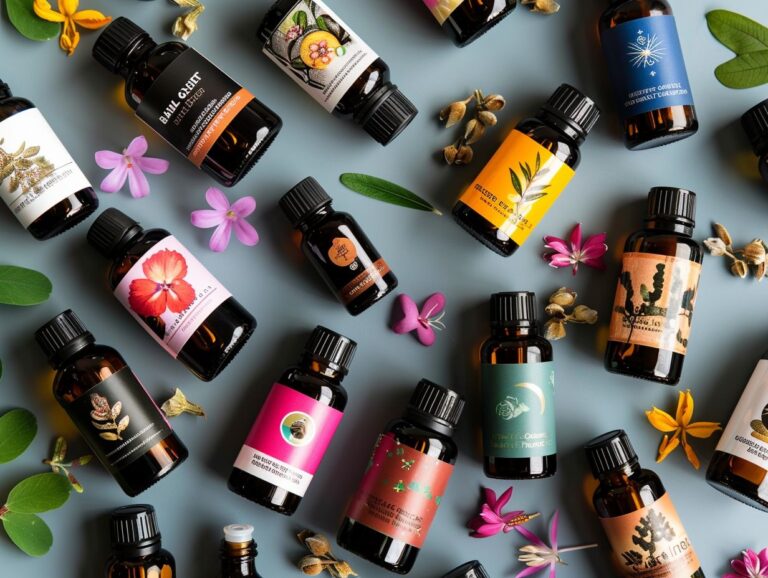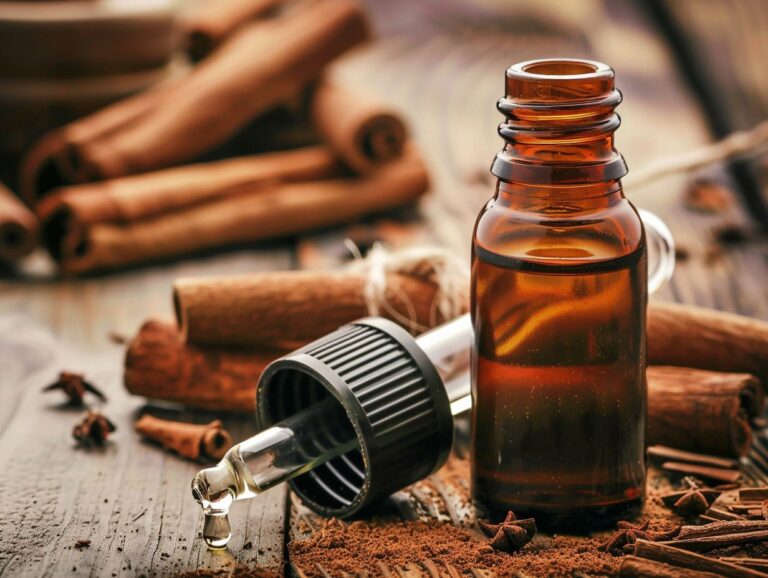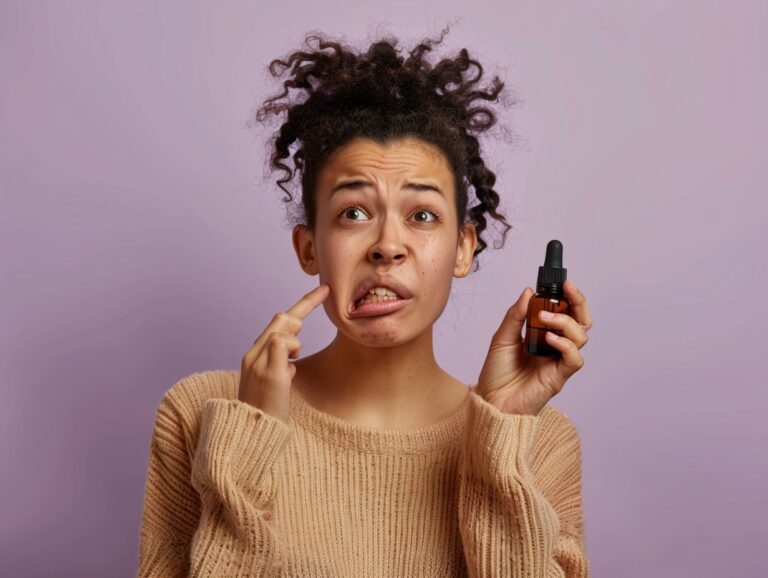Does Lavender Essential Oils Help With Anxiety
Lavender essential oil is a popular remedy known for its calming and soothing properties. This fragrant oil is made naturally and offers various uses and benefits. From alleviating headaches to improving skin health, lavender essential oil provides a wide range of benefits.
Discover how lavender essential oil can help reduce anxiety and stress effectively. We will also cover any potential risks or side effects associated with its use. Does lavender essential oil really help with anxiety? Let’s find out.
Key Takeaways:
What Is Lavender Essential Oil?
Lavender essential oil is a volatile oil extracted from Lavandula angustifolia, a species of the Lamiaceae family, known for its aromatic and therapeutic properties.
The extraction method of lavender essential oil involves steam distillation of the flowering tops of the Lavandula angustifolia plant. During this process, the plant material is placed in a distillation chamber where steam is passed through it, causing the essential oil to be released and collected. Linalool and linalyl acetate are the main constituents responsible for lavender oil’s characteristic scent and healing properties. Lavandula angustifolia, also known as English lavender, is the most commonly used species for producing high-quality lavender essential oil due to its rich fragrance and therapeutic benefits.
How Is Lavender Essential Oil Made?
Lavender essential oil is primarily made through a process of steam distillation or cold pressing of lavender flowers, which releases the beneficial compounds such as linalool and linalyl acetate.
During steam distillation, the lavender flowers are placed in a still with water, and steam is passed through the plant material, carrying the aromatic compounds with it. The steam is then condensed back into water, and the essential oil separates from the water. Cold pressing involves mechanically pressing the lavender flowers to extract the oil without using heat.
Linalool and linalyl acetate are two key compounds found in lavender essential oil known for their soothing and calming properties. These compounds contribute to the oil’s anti-inflammatory, antibacterial, and antifungal qualities.
What Are The Uses Of Lavender Essential Oil?
Lavender essential oil finds diverse applications, including aromatherapy, topical application for skin health, and ingestion for potential therapeutic benefits.
When used in aromatherapy, lavender essential oil is known to promote relaxation, reduce stress and anxiety, and improve sleep quality. Its soothing scent can create a calming atmosphere and help alleviate headaches and migraines.
For skincare, this versatile oil boasts antibacterial and anti-inflammatory properties, making it effective in treating acne, reducing scars, and hydrating the skin. It is often used in creams, lotions, and serums to enhance skin health.
In terms of ingestion, lavender oil is sometimes used in small amounts for its potential digestive and anti-inflammatory benefits. It is crucial to consult with a healthcare professional before consuming essential oils internally.
Aromatherapy
Aromatherapy involves the inhalation of lavender essential oil vapors, which can have a calming effect on the mind and body through its soothing scent and pharmacological mechanisms.
Inhalation of lavender essential oil triggers the olfactory system, sending signals to the limbic system of the brain, the area responsible for emotions and memories. This process stimulates the release of neurotransmitters like serotonin and dopamine, promoting relaxation and reducing stress levels. Lavender’s floral and herbaceous aroma further enhances its therapeutic properties, making it a popular choice for alleviating anxiety, insomnia, and migraines. The terpenes present in lavender oil contribute to its anti-inflammatory and analgesic effects, offering holistic benefits for both the mind and body.
Topical Application
Topical application of lavender essential oil is commonly used for improving skin health and alleviating skin conditions due to its soothing and therapeutic properties.
Lavender essential oil is renowned for its natural anti-inflammatory and antiseptic properties, making it a popular choice for skincare. When applied topically, it can help soothe irritations, reduce redness, and promote healing. The oil is gentle on the skin, making it suitable for most skin types. It can also aid in balancing oil production, making it beneficial for both dry and oily skin. The calming aroma of lavender can have a relaxing effect on the mind and body, providing additional benefits beyond just skincare.
Ingestion
Ingesting lavender essential oil through capsules or oral administration is a less common but potential method for experiencing its therapeutic effects, with a focus on safety and correct dosage.
When consuming lavender essential oil, it is crucial to ensure that the product is of high quality and intended for oral ingestion. Capsules offer a convenient way to measure dosage accurately, while oral methods like adding a drop to tea or water can be effective but require precision.
- Safety precautions: Before ingesting, it’s essential to consult a healthcare professional, especially for pregnant or nursing individuals, children, or those with medical conditions.
- Dosage considerations: The recommended dose varies based on the individual’s age, health status, and intended use. Starting with a low amount and gradually increasing is advisable.
Potential therapeutic benefits of lavender essential oil include its calming and relaxing properties, potential for aiding sleep, alleviating anxiety, and promoting overall well-being.
What Are The Benefits Of Lavender Essential Oil?
Lavender essential oil offers a range of benefits, including its potential to reduce anxiety, promote relaxation, alleviate headaches, relieve pain, and improve skin health, supported by its calming properties and effects on brain activity.
In terms of anxiety reduction, the soothing aroma of lavender essential oil has the ability to lower stress levels and create a sense of calm. This natural remedy is also known for its relaxation-promoting effects, making it a popular choice for creating a peaceful atmosphere during meditation or before bedtime.
The analgesic properties of lavender essential oil can help in alleviating headaches and muscular pain. Its anti-inflammatory nature is beneficial for reducing skin irritations, such as acne and eczema, thereby enhancing overall skin health.
Reduces Anxiety And Stress

In recent years, the use of lavender essential oil as a natural remedy for anxiety and stress has gained significant attention. Studies have shown that inhaling the aroma of lavender oil can help promote a sense of calmness and relaxation, making it a popular choice for those seeking alternative therapies.
Research has indicated that lavender oil works by modulating the GABAA receptors in the brain, which are responsible for regulating stress and anxiety levels. These receptors play a crucial role in promoting a feeling of well-being and tranquility.
Clinical trials have demonstrated that the anxiolytic effects of lavender essential oil can be attributed to its ability to influence the nervous system, inducing a state of relaxation and reducing feelings of tension.
Promotes Relaxation And Sleep
Lavender essential oil promotes relaxation and enhances sleep quality by modulating brain activity, inducing positive emotions, and creating a calming environment conducive to restful sleep.
Studies have shown that the aromatic compounds in lavender essential oil stimulate the activity of neurotransmitters such as serotonin, which plays a crucial role in regulating mood and sleep-wake cycles. This not only fosters a sense of calm but also helps in reducing stress and anxiety levels.
The inhalation of lavender essential oil triggers the release of endorphins, commonly known as ‘feel-good’ hormones, which can uplift mood and promote a sense of well-being, thus contributing to a more relaxed state conducive to sleep initiation.
Alleviates Headaches And Migraines
The analgesic properties of lavender essential oil help alleviate headaches and migraines by reducing pain perception, inflammation, and promoting a sense of relief and comfort.
Lavender essential oil has been utilized for centuries as a natural remedy for various ailments, including headaches and migraines. Its anti-inflammatory properties play a crucial role in soothing the tension often associated with these conditions.
The calming effects of lavender essential oil can help relax the mind and body, contributing to a reduction in headache intensity and frequency.
Studies have shown that inhaling lavender essential oil can significantly decrease the severity of headaches and migraines, making it a popular choice for those seeking natural relief.
Relieves Pain And Inflammation
The therapeutic properties of lavender essential oil extend to pain relief and inflammation reduction, showcasing its potential as an anxiolytic agent with therapeutic benefits for neurological disorders.
Lavender essential oil has been recognized for its remarkable ability to alleviate various types of pain, including headaches, migraines, and muscle soreness. Its anti-inflammatory effects can help reduce swelling and discomfort caused by conditions such as arthritis and rheumatism.
When inhaled or applied topically, lavender oil can have a calming effect on the nervous system, making it an effective solution for stress, anxiety, and insomnia. Studies have also indicated its potential in improving cognitive function and mood disorders.
Improves Skin Health
When used in skincare, lavender essential oil improves skin health by addressing various dermatological concerns, such as acne, eczema, and inflammation, with considerations for safety, especially for individuals on oral contraceptives.
Lavender essential oil is known for its soothing and anti-inflammatory properties, helping to calm irritated skin and reduce redness commonly associated with conditions like acne and eczema.
Its antibacterial qualities can also assist in fighting acne-causing bacteria, while its antioxidant properties aid in protecting the skin from environmental damage and signs of aging.
When applying lavender essential oil topically, it is essential to dilute it with a carrier oil to prevent skin irritation, especially for those with sensitive skin.
How Does Lavender Essential Oil Help With Anxiety?
Lavender essential oil aids in alleviating anxiety by interacting with GABAA receptors in the brain, modulating brain activity, inducing positive emotions, and reducing stress responses.
When lavender essential oil is inhaled, its aromatic molecules travel through the nasal passages and stimulate the olfactory nerves, sending signals to the limbic system, the part of the brain responsible for emotions and memories.
The interaction with GABAA receptors in the brain leads to a calming effect by enhancing the inhibitory signaling, which helps in reducing feelings of anxiety and promoting relaxation. This modulation of brain activity not only reduces stress responses but also uplifts mood, inducing a sense of tranquility and well-being.
Interacts With The Nervous System
The interaction of lavender essential oil with the nervous system is a subject of ongoing investigations to determine its safety, effectiveness, and potential therapeutic applications in neurological disorders.
Recent studies have shown promising results in understanding how lavender essential oil modulates neurotransmitter activity, particularly serotonin and GABA, contributing to its anxiolytic and mood-stabilizing effects. Researchers are exploring the mechanisms by which lavender compounds cross the blood-brain barrier, affecting neural pathways involved in stress response and emotional regulation. Clinical trials are being conducted to evaluate the use of lavender essential oil in conditions like anxiety disorders, insomnia, and migraine headaches, shedding light on its potential as a natural alternative to conventional pharmacological treatments.
Increases GABA Levels
Lavender essential oil has been shown to increase GABA levels in a manner similar to benzodiazepines but with a different pharmacological mechanism, highlighting its potential as an alternative to anti-anxiety medications.
Gamma-aminobutyric acid (GABA) is a neurotransmitter that works to inhibit or reduce the activity of neurons in the brain, promoting relaxation and reducing feelings of anxiety and stress.
Research indicates that the scent of lavender can have a calming effect on the nervous system, which is believed to be mediated by its ability to increase GABA levels in the brain.
This mechanism of action sets lavender essential oil apart from conventional anti-anxiety medications like benzodiazepines, offering a more natural and potentially safer option for those seeking relief from anxiety.
Reduces Cortisol Levels

Research has shown that the aroma of lavender can trigger relaxation responses in the brain, ultimately aiding in lowering cortisol levels. In addition, lavender essential oil has been found to have anxiolytic properties, helping individuals manage and reduce stress levels effectively. Clinical trials have demonstrated that inhaling lavender essential oil can promote a sense of calmness and overall well-being. Incorporating lavender essential oil into daily wellness routines has become increasingly popular for its proven ability to alleviate stress and anxiety.
How To Use Lavender Essential Oil For Anxiety?
Using lavender essential oil for anxiety can involve inhalation, topical application, or ingestion, each method offering distinct benefits for managing anxiety and stress.
When using lavender essential oil for inhalation, you can add a few drops to a diffuser or inhale directly from the bottle to promote relaxation and calmness.
For topical application, dilute a couple of drops of lavender oil with a carrier oil like coconut or almond oil and apply it to pulse points or the back of the neck for a soothing effect.
Ingesting lavender essential oil should be approached with caution and preferably under the guidance of a healthcare professional, as it can help alleviate anxiety when added to tea or water.
Inhalation
Inhalation of lavender essential oil is a common method for managing stress and anxiety, with the scent triggering positive responses in the brain to alleviate symptoms of anxiety disorders.
Studies have shown that inhaling lavender essential oil can significantly reduce the levels of cortisol, the stress hormone, in the body. This natural remedy has been praised for its ability to calm the mind and body, promoting relaxation and improving mood. The soothing aroma of lavender has a direct impact on brain activity, fostering a sense of tranquility and emotional well-being.
Topical Application
Topical application of lavender essential oil can be beneficial for anxiety relief, but caution must be exercised to avoid skin irritation or potential side effects.
Lavender essential oil is commonly used in aromatherapy and holistic medicine due to its calming properties which can help alleviate stress and anxiety when applied topically. Not only does lavender oil have a pleasant fragrance that promotes relaxation, but it also has proven anti-anxiety effects that can help reduce symptoms of anxiety disorders.
One of the advantages of using lavender essential oil is that it is a natural remedy, free from the side effects often associated with prescription medications. It is crucial to perform a patch test before widespread application to ensure compatibility with individual skin types.
Ingestion
Ingesting lavender essential oil can be considered for anxiety management, but it’s crucial to adhere to safety guidelines, proper dosage, and suitable oral administration methods.
When taking lavender essential oil orally, it is essential to dilute it in a carrier oil to prevent irritation or adverse effects on the digestive system. A recommended dosage for adults is typically 80-160 mg per day, but it is always wise to start with a lower dosage and gradually increase if necessary.
It is advisable to consult a healthcare professional before incorporating lavender essential oil into your oral routine, especially if you are pregnant, nursing, or on any medications, to ensure it is safe for your specific circumstances.
Are There Any Risks Or Side Effects Of Using Lavender Essential Oil?
While lavender essential oil is generally safe, there are potential risks and side effects associated with its use, including skin irritation, allergic reactions, and interactions with certain medications.
It is essential to perform a patch test before using lavender essential oil topically, as some individuals may experience skin irritation or redness upon application.
Allergic responses like hives or respiratory issues could occur in sensitive individuals, necessitating caution when using the oil.
Lavender oil may interact with certain medications, such as sedatives or blood thinners, leading to adverse effects or reduced efficacy.
Skin Irritation
Skin irritation can occur in some individuals using lavender essential oil, underscoring the importance of patch testing and assessing skin tolerability before widespread application.
It is crucial to note that while lavender essential oil is generally considered safe, it can still cause skin reactions such as redness, itching, or a burning sensation, especially for those with sensitive skin. Patch testing involves applying a small amount of diluted oil to a small patch of skin, typically on the inner arm, and observing for any adverse reactions. This precautionary measure helps individuals determine their skin’s response to the oil before using it extensively.
Allergic Reactions
Allergic reactions to lavender essential oil are possible, particularly in cases of ingestion, necessitating caution and awareness of potential sensitivities to prevent adverse responses.
When lavender essential oil is ingested, it can trigger allergic reactions such as skin rashes, itching, swelling, and even respiratory issues in some individuals. It’s crucial to understand that allergies to lavender oil can vary from mild to severe, depending on the person’s sensitivity. Individuals with a history of allergies, asthma, or skin sensitivities should be especially cautious when using lavender oil.
To minimize the risk of adverse reactions, it is recommended to perform a patch test before using lavender oil topically and dilute it properly. Moreover, avoiding ingestion of undiluted lavender oil is crucial to prevent potential allergic responses in sensitive individuals.
Interactions With Medications

Lavender essential oil may interact with certain medications when ingested orally, highlighting the importance of consulting healthcare professionals to ensure safety and prevent adverse interactions.
When lavender essential oil is taken orally, it can potentially affect the metabolism of certain drugs in the body, leading to altered drug levels and effects. For example, it may interact with sedatives, blood pressure medications, or hormone-regulating drugs.
To mitigate these risks, it is crucial to inform your healthcare provider about any use of lavender essential oil and discuss any potential interactions that may occur. Your provider can offer guidance on dosage adjustments or alternative treatment options to avoid unwanted side effects and ensure your overall well-being.
Conclusion: Does Lavender Essential Oil Really Help With Anxiety?
While lavender essential oil shows promise in anxiety management, further research, clinical trials, and investigations are essential to ascertain its true effectiveness and safety for individuals seeking alternative therapies.
Research has suggested that the soothing aroma of lavender may help reduce stress and anxiety levels in some individuals. The existing evidence is primarily based on small-scale studies or anecdotal reports. Large-scale clinical trials are needed to validate these findings and determine the optimal dosage, administration methods, and potential side effects of using lavender essential oil for anxiety treatment.
Exploring the mechanisms of action of lavender essential oil on the nervous system and its interaction with neurochemicals could provide valuable insights for enhancing its therapeutic benefits. Investigating its potential interactions with conventional medications and its long-term effects on mental health is crucial for ensuring safe and effective integration into treatment protocols.
Frequently Asked Questions
Does Lavender Essential Oils Help With Anxiety?
Yes, many people have reported that using lavender essential oils helps to reduce feelings of anxiety and promote relaxation.
How does lavender essential oil help with anxiety?
Lavender essential oil contains compounds that have been shown to have a calming effect on the nervous system, promoting relaxation and reducing anxiety.
How can I use lavender essential oil for anxiety relief?
Lavender essential oil can be used in a variety of ways, such as diffusing it in a room, applying it topically, or adding a few drops to a warm bath.
Are there any side effects of using lavender essential oil for anxiety?
In general, lavender essential oil is considered safe for most people. However, some individuals may experience skin irritation or allergic reactions. It is always recommended to do a patch test before using any essential oil topically.
Can lavender essential oil be used as a substitute for medication in treating anxiety?
No, lavender essential oil should not be used as a substitute for prescribed medication in the treatment of anxiety. It can be used as a complementary therapy, but always consult with a healthcare professional before making any changes to your treatment plan.
Are there any precautions I should take when using lavender essential oil for anxiety?
Yes, always make sure to dilute lavender essential oil before applying it topically and avoid using it around pets, as it can be toxic to certain animals. It is also important to use high-quality, pure lavender essential oil to ensure safety and effectiveness.







